Japan
Wood Products Prices
Dollar Exchange Rates of 10th
October 2016
Japan Yen 103.61
Reports From Japan
Business sentiment stalls
The Bank of Japan's quarterly Tankan survey indicates
that, while large enterprises are still investing, they are
doing so at levels unchanged from June. The impact of
the strong yen and subdued consumer spending are the
main factors which have stalled business sentiment.
Analysts anticipate the current mood in companies will be
the pattern for the balance of the year, even though on the
domestic front the impact of the Kumamoto earhquake
was less devastating than first thought for manufacturers
with production plants in the area and even as concerns for
the direction of the global economy are easing.
Consumer confidence rise beats expectations
The September consumer confidence survey conducted by
the Bank of Japan (BoJ) shows confidence continues to
improve in sharp contrast to the expected decline.
Among the various components, the index for overall
livelihood rose to 42.0 in September from 40.9 in August,
the income growth assessment was almost unchanged but
the index for employment prospects rose as did the index
for willingness to buy durable goods.
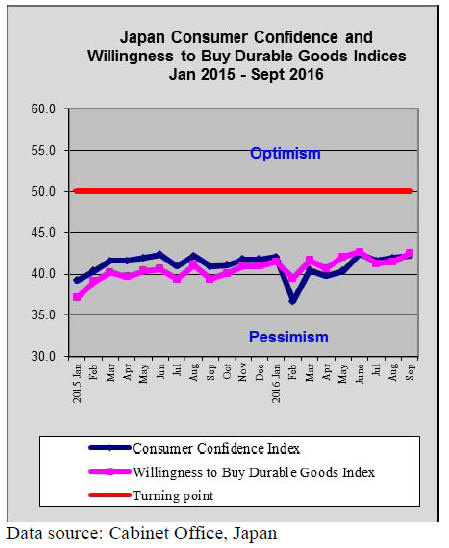
Machinery orders fall
The total value of machinery orders received by 280
manufacturers operating in Japan fell by 4% in August
from the previous month. Private-sector machinery orders,
excluding those for ships and for power company
machinery, declined by 2.2% in August.
The trend in core machinery orders, a highly volatile data
series, is regarded as an indicator of potential capital
expenditure over the next six to nine months.
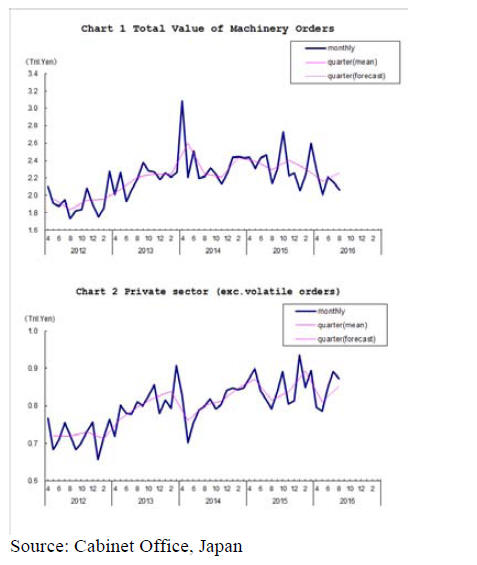
Only US interest rate decision can bring down yen
exchange rate
The yen continued to strengthen against the US dollar in
early October, a trend that has been apparent all year,
despite the decision of the BoJ to adopt negative rates in
an effort to stem the yen‘s rise. The yen has surged more
than 15% against the US dollar so far this year.
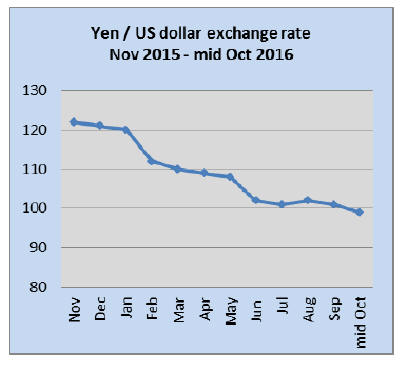
While the US continues with its loose monetary
policy
there is little to attract funds into the US dollar. In early
October the yen flirted with the 99/dollar level, the
strongest it has been all year.
It is widely anticipated that interest rates in the
US will
rise as early as December which may bring some relief for
the beleaguered BoJ.
August housing starts up from a year earlier
Japan’s Ministry of Land, Infrastructure, Transport and
Tourism has reported that housing starts grew for the
second straight month in August, despite dropping
compared to levels in July, a fall reflecting the holidays
taken during the month. However, looking at the data it is
clear that the pace of acceleration seen over recent months
has slowed.
August 2016 starts were 2.5% higher than in August last
year but the performance in August was well below
analyst’s expectations.
Projecting forward to year end, housing starts could come
in at under 1 million. Despite the weak numbers for
August orders received by the top builders increased, the
first increase in three months.
See: http://www.estat.
go.jp/SG1/estat/ListE.do?lid=000001159965
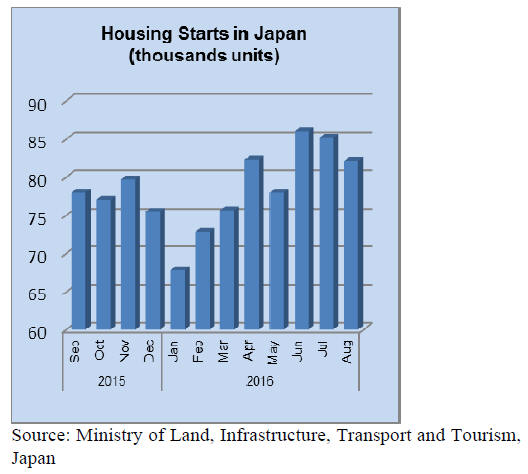
Japan’s furniture imports
After a very good start to the year the pace of growth in
wooden furniture imports has steadily slowed. From the
highs in January this year wooden office furniture imports
have fallen almost 7%, wooden kitchen furniture imports
are down 29% from January and wooden bedroom
furniture imports have dropped 25% from levels in
January.
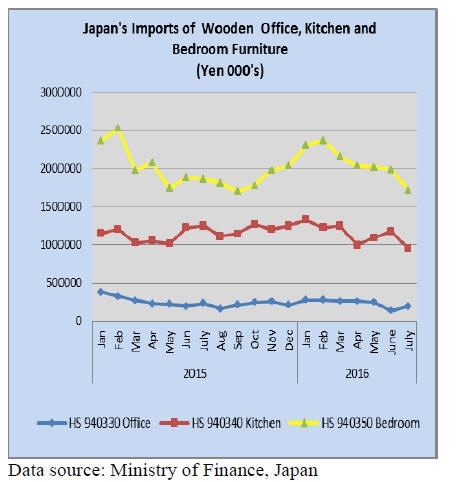
Office furniture imports (HS 940330)
Year on year, imports of wooden office furniture in July
were down 16% but compared to the previous month July
imports rose over 40%.
The top three suppliers, China, Italy and Poland all saw an
increase in sales to Japan in July. Shipments from China
were up 19%, those from Italy nearly doubled and
shipments from Poland rose 44% compared to a month
earlier.
China is the main wooden office furniture supplier to
Japan and in July accounted for over 60% of all imports.
Imports from Italy accounted for a further 6% and imports
from Poland came in at around 4.5%.
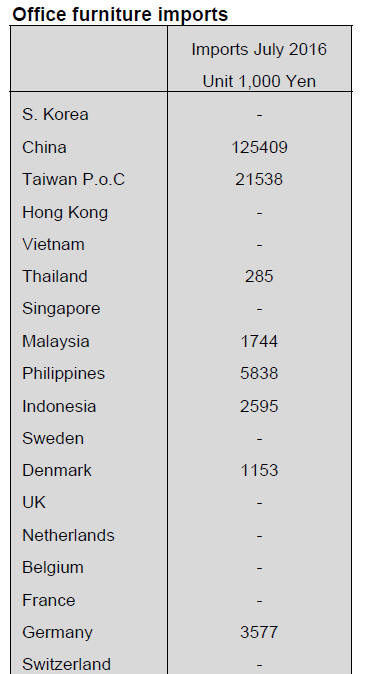 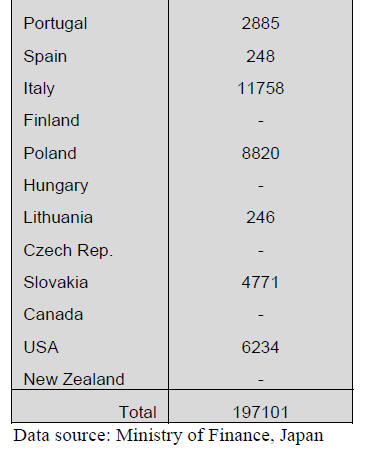
Kitchen furniture imports (HS 940340)
The increasing trend in wooden kitchen furniture imports
over the past two months came to an abrupt end in July as,
compared to a month earlier imports fell almost 20%.
Also, year on year July imports were down 6%.
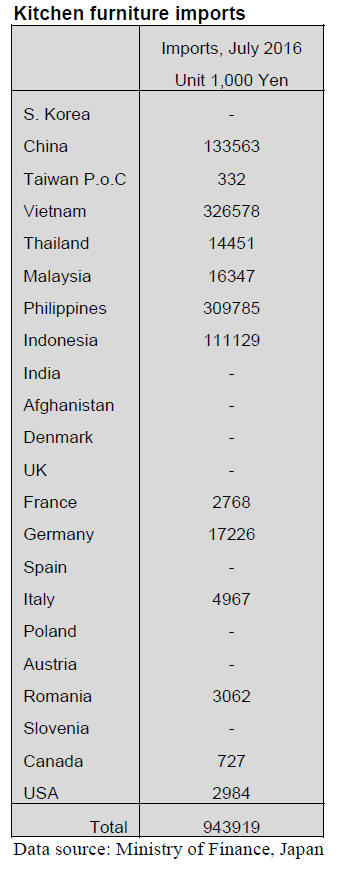
Two suppliers Vietnam and Philippines dominate
Japan’s
imports of wooden kitchen furniture accounting for around
67% of all imports of this product and if imports from
China and Indonesia are included then over 90% of all
wooden kitchen furniture is accounted for.
The year on year downward trend in imports of wood
kitchen furniture spills over to month on month data also.
In July this year imports from the top supplier, Vietnam,
dropped 35% and imports from the Philippines fell 12%.
Amongst the other small suppliers of kitchen furniture to
Japan in July this year only Germany stands out having
supplied around 2% of Japan’s overall wooden kitchen
furniture imports.
Bedroom furniture imports (HS 940350)
At 59% of all wooden bedroom furniture imports to Japan
in July, China stands out as the main supplier. The second
and third ranked suppliers in July were Vietnam (28%)
and Thailand (6%).
Year on year wooden bedroom furniture imports in July
were down 8% but there was an even sharper fall in month
on month imports (-13%).
Compared to June suppliers in Europe accounted a smaller
proportion of wooden bedroom furniture imports
accounting for 3.9% in July compared to 5% in June.
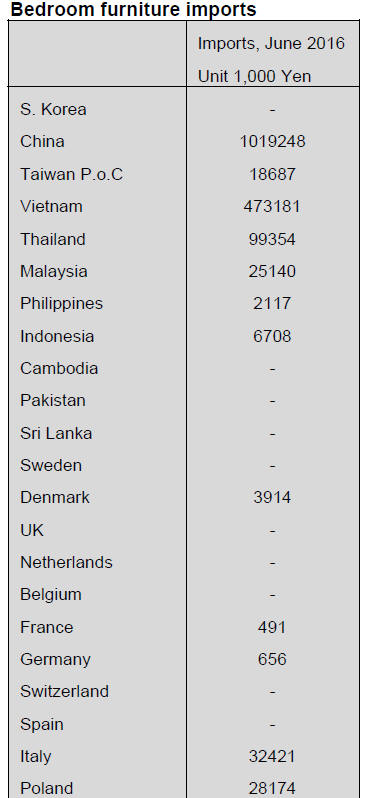 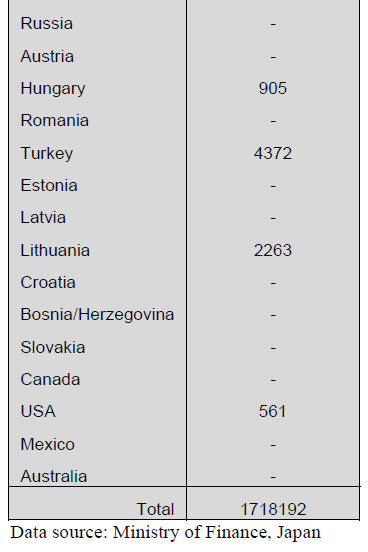
Trade news from the Japan Lumber Reports (JLR)
For the JLR report please see:
http://www.n-mokuzai.com/modules/general/index.php?id=7
South Sea (Tropical) logs
In Sarawak, India is reducing log purchase after FOB
prices increased as a result of reduction of log export
quota in July by 10%.Sarawak meranti regular prices are
US$275-278 per cbm FOB. If the prices go over US$280,
Japan is likely to stop buying.
Small meranti prices are US$255 and super small are
US$240. Production of kapur and keruing is extremely
limited so it is necessary to pay high prices to have the
supply.
PNG and Solomon Islands have fair weather and log
production is steady. Chinese purchase is slower now so
that Japan can buy easier but India is increasing log
purchase after reduced log production in Sarawak.
In Japan, softwood plywood demand is very active so that
mills are making softwood plywood so South Sea log
consumption is reduced.
Earthquake resistant standard remains unchanged
The Ministry of Land, Infrastructure and Transport and the
Building Research Institute disclosed direction that the
earthquake resistant standard should remain unchanged
after they investigated damages of recent Kumamoto
earthquake.
Since many buildings were built based on the former
standard of 1981 and new standard in 2000 collapsed so it
is necessary to reinforce quake resistant measures on
already built houses.
By the housing performance labelling system started in
2000, earthquake resistant class is established. Class 3
houses in Masuki town, where damages were heavy,
remain almost free of damage but seven houses built after
2000 collapsed but it was found that those had many
efficiency in design and execution of works so they did
not fully conformed to the standard so the committee feels
it is not necessary to revise the standard now.
The Building Standard Act is originally set back in 1950
then new standard is set in 1981 so the Ministry reviewed
and revised quake resistant standard every time strong
quake occurred. As a result of revision of standard, about
28% of building built by the former standard collapsed,
8.7% by the new standard then only 2.2% by 2000
standard so by tightening the standard, damage declined.
However, regardless of the rules, many wooden buildings
built in recent years have deficiency in structural design
and actual works, which led to extensive damages so there
are apparent reasons of collapse like braces and metal
fasteners were missing.
Forestry Agency’s budget request
The Forestry Agency’s supplementary budget for fiscal
year 2016 is 102.2 billion yen, 72.6% more than 2015 as a
result of addition of restoration budget for Kumamoto
earthquake and heavy rain.
Restoration budget for Kumamoto earthquake and
localized torrential downpours in Kyushu is 36,496
million yen to restore damaged forest and wood
processing facilities and other main budget is 31 billion
yen as compared to 22 billion yen in 2015, which is used
for subsidy for forest maintenance like thinning and road
system.
Budget of 33 billion yen is allocated for preparation of
large scale, high efficient wood processing facilities,
thinning to make stable supply of raw materials to such
facilities and maintenance of logging road system out of
which one billion yen is used for manufacturing of CLT
then another one billion yen is allocated for CLT related
subsidy.
Initial budget request for 2017 is 343.6 billion yen, 17.2%
more than 2016. 144.3 billion yen is allocated for thinning
and maintenance of road system, 71.7 billion yen for forest
conservation and 15 billion yen as subsidy to increase log
production and preparation of wood processing facilities.
Subsidy of 15 billion yen is used for introduction of high
efficient logging machineries, production facilities for
containerised seed bed, production facilities of CLT, wood
biomass related facilities like wood chip plant,
introduction of wood biomass boilers for which one third
or one half of expenses are subsidised.
For development of new demand for wood, 1.5 billion
yen is allocated. This is used for establishing application
method of CLT, development of fire proof materials,
wood use for non-residential buildings, value added
lumber products, wood use for engineering works, support
to obtain forest certificate.
In this 500 million yen is used for promotion of use of
cellulose nanofiber, heat utilization of biomass and stable
supply of fuel. 100 million yen is used for providing
information prior to start of clean wood law to control
illegal harvest coming in May 2017.
Certified wood biomass fuel from Thailand
Wood Pellet Siam Company limited (WPS) in Thailand,
which markets rubber wood pellet for fuel has acquired
certificate from JIA (Japan Gas Appliances Inspection
Association) as wood biomass fuel. There are more than
750 fuel suppliers with the certificate in Japan but this is
the first overseas supplier with the certificate.
This means that any wood biomass power generator uses
WPS pellet is qualified as recyclable energy in FIT system
and purchase price of electricity is 24 yen per 1kwh. WPS
is a subsidiary of Impact Electron Siam, which invests and
develops recyclable energy like solar power generation in
the Asia Pacific region.
Certified wood pellet is produced by waste of rubber wood
by some furniture manufacturing company. Monthly
production is 2,500 ton. WSP buys this and export for
Japan. Rubber wood tree is aged at about 25 years, which
is time to cut down and replant so the government is
promoting to replant rubber trees and gives subsidy to
farmers.
Harvested rubber trees are used for furniture
manufacturing but only half of fell trees are recovered for
furniture so waste is used as fuel.
WPS plans to build its own wood biomass fuel plant and
the first phase will complete in 2017 with the production
of 10,000 ton then it will keep expanding the facility in
three years and eventual target is 30,000 ton a month.
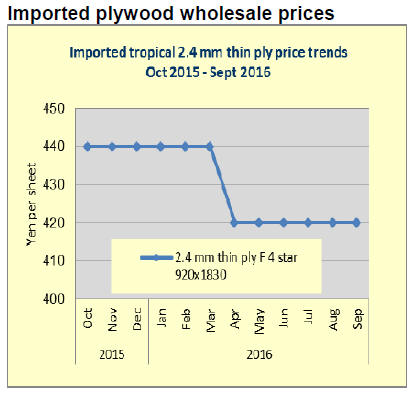 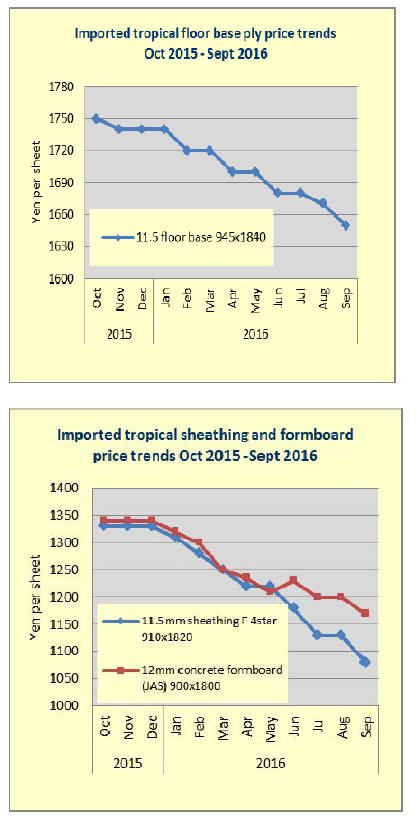
|